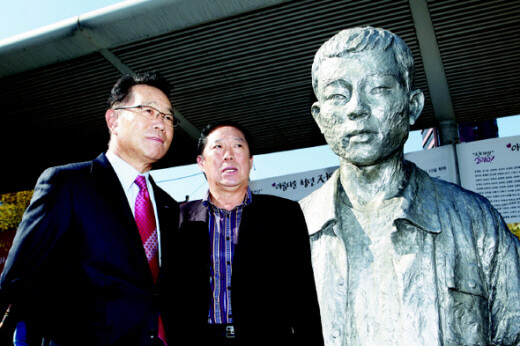hankyoreh
Links to other country sites 다른 나라 사이트 링크
From 1970 to 2010: an unrelenting call for improved labor conditions

By Jeon Jong-hwi
At around 1:30 p.m. on Nov. 13, 1970, Chun Tae-il, a young fabric cutter at Seoul’s Pyeonghwa Market, set fire to himself in a call for improvements in labor conditions. He was demanding adherence to the Labor Standards Act and time off on Sundays. “We are not machines,” he cried at the time. For Korean intellectuals, who were caught up in the movement for political democratization under the brutal rule of the military administration, Chun’s self-immolation was a tremendous shock. His act was an arrow directed at the conscience of Korean society.
Jeon was born in 1948 in Daegu, North Gyeongsang Province, to poor dressmaker Chun Sang-su and Lee So-seon. Economic deprivation and hunger were constant companions throughout his life. In 1964, when he was sixteen, he went to Seoul in search of his mother, who had gone to earn money. After scraping out a difficult living selling newspapers and shining shoes, he began work the next year as a sewing machine helper at a sewing factory in Pyounghwa Market by the Cheonggyecheon stream.
The harsh working conditions lit a fire in Chun’s heart. Young women in their teens worked fifteen-hour days in a loft where they could not stand up straight, yet it was impossible even to eat on their monthly pay. After their long hours of exhausting work, they developed a variety of eye problems, stomach ailments, and neuralgia. Health examinations were perfunctory. Two or three of the factory’s thirty workers received checkups, but the X-ray machine they stood before did not have any film loaded in it.
The labor laws prescribing eight-hour working days and regular health examinations were little more than scraps of paper. The labor supervisor from the labor office was a figurehead. Chun, who had not completed an elementary school education, began teaching himself about the Labor Standards Act, but he had difficulty reading words that were written in Chinese characters. His plaintive wish that he might have a university student friend by his side would pierce the hearts of countless university students after his death.
Together with other cutters, Chun formed the “Fools’ Association” and “Samdong Friendship Association” to investigate labor conditions. At the same time, he worked to let the labor office and press know the truth and sought methods of improvement. Unable to accomplish this due to the insincere efforts of the labor office and the interference of detectives from the police intelligence department, Chun died through self-immolation on Nov. 13, crying, “Don’t let my death be in vain.”
Thirteen years later in 1983, during the New Military Group era under President Chun Doo-hwan, a book was released by Dolbegae Publishing entitled Critical Biography of Chun Tae-il: The Life and Death of a Young Worker, Chun Tae-il Pyeongjeon: Eoneu Cheongnyeon Nodongjaui Samgwa Jugeum. There was no author listed on the book. A new book came out in 1991 bearing the author’s name of attorney Jo Yeong-rae, but Jo had died just before from lung cancer. Last year, a new edition was printed with slight revision of the content. In 1995, the film A Single Spark was made about his life. This year, the Busan-Masan Uprising Commemorative Project Committee staged the play Goodbye Mother, Eomma Annyeong, which commemorates the 40th anniversary of Chun’s act, and recently four publishing companies jointly published the book You Are Me, Neoneun Nada .
With events like these, we can still see the spirit of Chun Tae-il living among us. Chun was an arrow who left the string but has not yet struck the target.
Please direct questions or comments to [englishhani@hani.co.kr]
Editorial・opinion
![[Column] Park Geun-hye déjà vu in Yoon Suk-yeol [Column] Park Geun-hye déjà vu in Yoon Suk-yeol](https://flexible.img.hani.co.kr/flexible/normal/500/300/imgdb/original/2024/0424/651713945113788.jpg) [Column] Park Geun-hye déjà vu in Yoon Suk-yeol
[Column] Park Geun-hye déjà vu in Yoon Suk-yeol![[Editorial] New weight of N. Korea’s nuclear threats makes dialogue all the more urgent [Editorial] New weight of N. Korea’s nuclear threats makes dialogue all the more urgent](https://flexible.img.hani.co.kr/flexible/normal/500/300/imgdb/original/2024/0424/7317139454662664.jpg) [Editorial] New weight of N. Korea’s nuclear threats makes dialogue all the more urgent
[Editorial] New weight of N. Korea’s nuclear threats makes dialogue all the more urgent- [Guest essay] The real reason Korea’s new right wants to dub Rhee a founding father
- [Column] ‘Choson’: Is it time we start referring to N. Korea in its own terms?
- [Editorial] Japan’s rewriting of history with Korea has gone too far
- [Column] The president’s questionable capacity for dialogue
- [Column] Are chaebol firms just pizza pies for families to divvy up as they please?
- [Column] Has Korea, too, crossed the Rubicon on China?
- [Correspondent’s column] In Japan’s alliance with US, echoes of its past alliances with UK
- [Editorial] Does Yoon think the Korean public is wrong?
Most viewed articles
- 1‘We must say no’: Seoul defense chief on Korean, USFK involvement in hypothetical Taiwan crisis
- 2N. Korean delegation’s trip to Iran shows how Pyongyang is leveraging ties with Moscow
- 3‘Weddingflation’ breaks the bank for Korean couples-to-be
- 4Will NewJeans end up collateral damage in internal feud at K-pop juggernaut Hybe?
- 546% of cases of violence against women in Korea perpetrated by intimate partner, study finds
- 6[Column] Park Geun-hye déjà vu in Yoon Suk-yeol
- 7“Parental care contracts” increasingly common in South Korea
- 8[Column] Yoon’s first 100 days should open our eyes to pitfalls of presidential system
- 9[Interview] Dear Korean men, It’s OK to admit you’re not always strong
- 10[Editorial] New weight of N. Korea’s nuclear threats makes dialogue all the more urgent